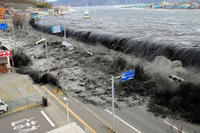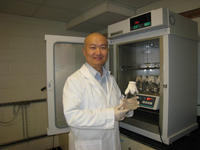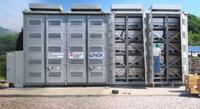-
Pace University launches new cybersecurity institute
Last week Pace University announced that it had launched a special institution aimed at helping the United States alleviate the critical shortage of cybersecurity professionals and secure the nation’s data networks
-
-
Senate stalls on easing visa restrictions for highly skilled immigrants
A bill meant to allow more high-skill immigrants from India and China to obtain green cards has been placed on hold by Senator Charles Grassley (R-Iowa) over concerns that it should do more to “protect Americans at home”
-
-
Japan tsunami waves merged, doubling power

Researchers have discovered that the destructive tsunami generated by the March 2011 Tōhoku-Oki earthquake was a long-hypothesized “merging tsunami” that doubled in intensity over rugged ocean ridges, amplifying its destructive power before reaching shore
-
-
Making sure skyscraper foundations stand up to earthquakes
Engineers are preparing to conduct the first rigorous tests of how the steel columns that secure skyscrapers to their foundations stand up during earthquakes, research that could make the towering structures safer — and perhaps less expensive to build
-
-
Strong ground motion shows need to modify building codes
Population growth and scarcity of undeveloped metropolitan land have changed urban land use patterns and placed an increasing number of people and infrastructure in areas susceptible to topographic effects during earthquakes; building codes should take such trends into account
-
-
NERC CIP-compliant grid security reporting tool
NERC CIP Standard is a comprehensive framework of physical and cyber security best practices to safeguard the bulk power system for North America; Skybox Security shows NERC CIP-compliant grid security reporting tool
-
-
U.S. critical infrastructure security response system is broken
Since its inception, DHS has urged states and cities to establish Fusion Centers to collect information from power companies and water utilities about infrastructure-related incidents with national security implications. There are now seventy-two Fusion Centers in the United States. A recent confusion about the causes of disruption of an Illinois water utility pump raised question about the effectiveness of the Fusion Center information collection and reporting system.
-
-
Portable wastewater system generates energy, produces drinking water

Researchers are working to develop a portable wastewater treatment system that could improve the military’s efficiency; the solar-bio-nano project also will generate energy and produce drinking water, thus providing a potential blueprint for the future of municipal/agricultural wastewater treatment systems
-
-
U.K. unveils new cyber defense strategy
The U.K. government last week published its new Cyber Security Strategy; the government said the new strategy sets out “how the United Kingdom will support economic prosperity, protect national security, and safeguard the public’s way of life”
-
-
House Intelligence panel investigates Chinese telecom giants

As Chinese telecom giants Huawei Technologies Co. and ZTE Corp continue to eye the lucrative American market, they have come under increasing scrutiny from U.S. lawmakers who fear their technology could be used by Chinese hackers to steal U.S. secrets; the two Chinese companies are now the subject of a House Intelligence Committee investigation aimed at determining whether they are a threat to the United States
-
-
Sector Report for Monday, 28 November 2011: Infrastructure protection
This report contains the following stories.
-
-
DHS: Hackers did not cause Illinois water pump to fail
Cybersecurity experts and critical infrastructure operators can rest a bit easier now that DHS investigators have determined there is nothing to suggest that hackers caused a water pump to fail in Springfield, Illinois
-
-
Large-scale power storage for the energy grid

The sun does not always shine and the wind does not always blow; Stanford University researchers have used nanoparticles of a copper compound to develop a high-power battery electrode that is inexpensive to make, efficient and durable that it could be used to build batteries big enough for economical large-scale energy storage on the electrical grid
-
-
Pentagon confirms policy of military response to cyberatacks
In a Pentagon report recently made public, the U.S. military confirmed that it would launch physical strikes in response to cyberattacks
-
-
U.K. banks pass cyberdefense stress test
To bolster cyberdefenses in the financial industry, U.K. banks recently took part in a stress test to determine their ability to cope with a cyberattack; eighty-seven banks took participated in the drill including Barclays, HSBC, and Royal Bank of Scotland
-
More headlines
The long view
Helping Strengthen America’s Critical Infrastructure
Everyday life depends on a robust infrastructure network that provides access to running water, communications technology and electricity, among other basic necessities. The experts who keep our national infrastructure secure and resilient also need a strong network to share their knowledge and train the next generation of professionals capable of solving complex infrastructure challenges.
AI and the Future of the U.S. Electric Grid
Despite its age, the U.S. electric grid remains one of the great workhorses of modern life. Whether it can maintain that performance over the next few years may determine how well the U.S. competes in an AI-driven world.
Using Liquid Air for Grid-Scale Energy Storage
New research finds liquid air energy storage could be the lowest-cost option for ensuring a continuous power supply on a future grid dominated by carbon-free but intermittent sources of electricity.
Enhanced Geothermal Systems: A Promising Source of Round-the-Clock Energy
With its capacity to provide 24/7 power, many are warming up to the prospect of geothermal energy. Scientists are currently working to advance human-made reservoirs in Earth’s deep subsurface to stimulate the activity that exists within natural geothermal systems.
Experts Discuss Geothermal Potential
Geothermal energy harnesses the heat from within Earth—the term comes from the Greek words geo (earth) and therme (heat). It is an energy source that has the potential to power all our energy needs for billions of years.
